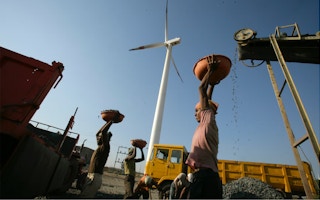Nuclear power could be a “game-changer” for India’s transition from a coal-based to low-carbon economy, according to a Delhi-based climate technology entrepreneur.
To continue reading, subscribe to Eco‑Business.
There's something for everyone. We offer a range of subscription plans.
- Access our stories and receive our Insights Weekly newsletter with the free EB Member plan.
- Unlock unlimited access to our content and archive with EB Circle.
- Publish your content with EB Premium.
Speaking at the inaugural Unlocking Capital for Sustainability India event, held virtually on 16 September, Shailesh Vickram Singh, founder of climate tech investment platform Climate Angels, said nuclear had untapped potential as an energy source for India.
Unlocking Capital for Sustainability India is part of a series of events on sustainability finance organised by Eco-Business, which culminates in a main conference in Singapore on 21 September.
The other speakers included Dimgong Rongmei, executive director, RNBA, a non-profit which works with Indigenous communities in Manipur, and Vishal Pandya, director of renewable energy certificate trader REConnect Energy, who discussed how the country can balance climate action with developmental needs.
“We should really start looking at it [nuclear]. Of all the potential energy sources, nuclear could be a real game-changer,” Singh said.
India has been “missing out” on the potential of nuclear to increase energy access and raise living standards, he added.
Most of India’s power is sourced from coal, but the world’s fourth largest carbon emitter has been under growing pressure to switch to alternatives to fossil fuels as the climate crisis intensifies.
India currently generates around 3 per cent of its energy from 22 nuclear reactors, and announced plans to build 10 nuclear power plants by 2025 earlier this year.
Singh’s comments come a month after plans emerged to build two nuclear facilities in Madhya Pradesh in central India.
Singh said a new generation of smaller-scale nuclear plants presented countries like an India with the opportunity to “leapfrog” other more polluting power sources.
More than a decade after the Fukushima nuclear disaster in Japan, it is no longer taboo to promote nuclear energy, and the Ukraine war-induced energy crisis has heightened calls for atomic energy, which supporters say can tackle both energy security and climate change.
Singh said the threat of nuclear disaster is “overblown” and the risk of accidents is low.
“The issue is how to communicate it [nuclear energy]. It will take another five to 10 years to change perceptions,” he said.
More investment was needed to drive innovation in the nuclear energy sector, which he said was currently lacking, he added.
Climate capital and risk
Managing risk was a key theme for speakers at the Unlocking Capital for Sustainability India event.
Gagan Sidhu, director of Delhi-based thinktank Centre for Energy Finance at Council on Energy, Environment and Water (CEEW), said awareness of climate risk is growing in India’s business and finance sector, although there is a need to shift the focus of capital from mitigation to adaptation as climate impacts worsen.
India was hit by a record-breaking heatwave over the summer that wilted the country’s agricultural output and caused prolonged electricity shortages. In July, the Reserve Bank of India (RBI), India’s central bank, published a paper to encourage the finance sector to prioritise climate risk in decision-making.
“It’s early days for the climate risk discussion,” said Sidhu. “But we need to look no further than over our border in Pakistan [which is experiencing extreme flooding] to realise how important it is.”
Banks and venture capitalists need to take more risks on India’s climate entrepreneurs, which have struggling to raise capital. Rather than focus solely on large-scale infrastructure projects, such as wind and solar farms, more bets should be placed on early-stage climate startups, said Singh.
“The time has come for venture capital to consider climate tech,” said Singh.
India produces more startups than anywhere besides United States and China, but clean tech start ups are finding it difficult to access capital, mainly due to a lack of understanding of climate technology among investors and unclear government policies.
Singh said a key barrier is the climate entrepreneurs themselves. “They are saying, ‘we’re an impact startup, we won’t give you a return.’ That’s the wrong mindset.”
To achieve net-zero by 2070, a target set at the COP26 climate talks, India will require US$10.1 trillion in investment. The stage is set for climate entrepreneurship to break through India’s startup scene, said Singh.
“Consumers are asking for it. The government is pushing for it. The only thing that has to move is the capital,” said Singh.
As more capital starts to move into climate tech – green bond issuances in India quintipled last year – India is well-positioned to become a green finance hub for developing countries, Sudhu propposed.
“The challenges that investors in the Indian energy transition … need to understand are common to developing companies such as Vietnam, Indonesia or countries in Africa.”
“It only makes sense to develop a hub which not only looks at raising capital for India, but also for other countries in emerging Asia,” he said.














